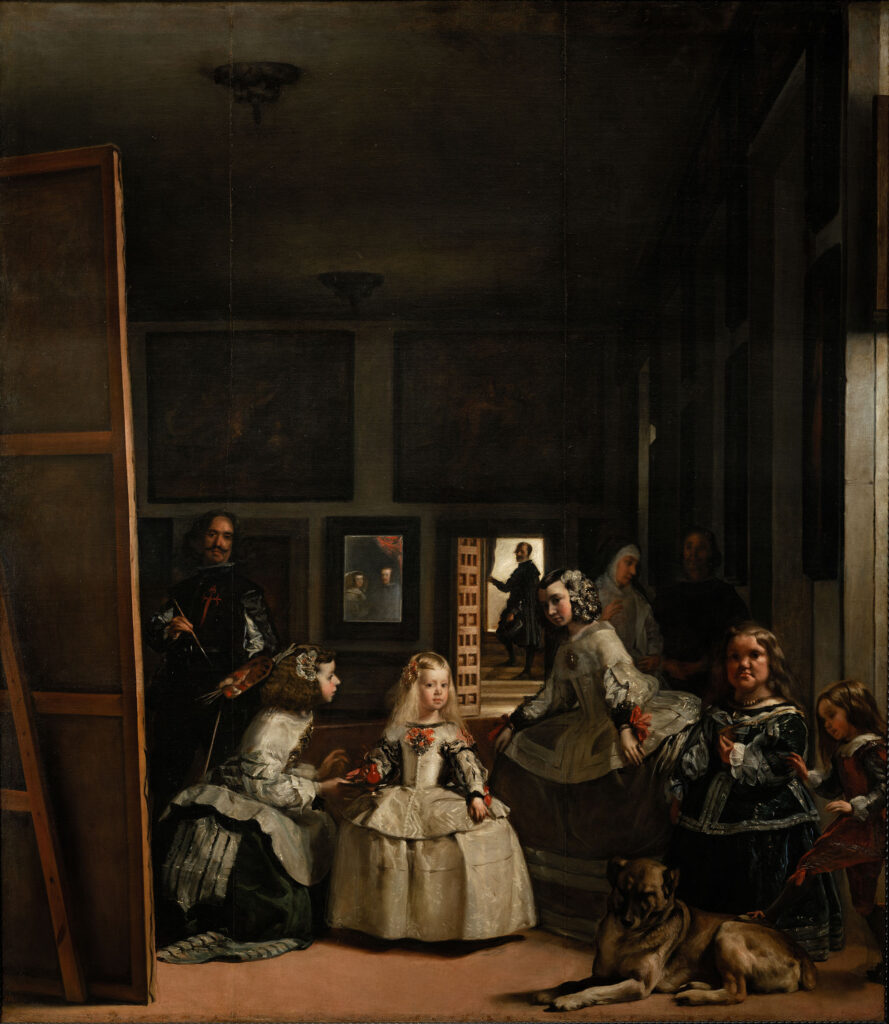Michel Foucault was one of the leading French philosophers of the 20th century. Often considered a postmodernist, he did not believe there was a final perspective that human knowledge could achieve. This immediately contrasts with the outlook of leading physicists like Stephen Hawking. In his 1988 classic, A Brief History of Time, Hawking concludes the book by saying, once science has achieved a theory of everything, which is not far off, we will “know the mind of god.”
In his 1966 key work, The Order of Things: An Archaeology of the Human Sciences (French: Les Mots et les Choses: Une archéologie des sciences humaines), Foucault argued that the so-called order of things is invented, not discovered, by us. This is contrary to scientific thought.
Foucault sets up this limit in his surprising interpretation of the Diego Velázquez masterpiece painting, Las Meninas (Spanish: The Ladies-in-waiting). The painting is deliberately elusive in its use of perspective.

The great German thinker, Jürgen Habermas, explained this Foucault/Velázquez perspective difficulty:
This picture portrays the painter in front of a canvas not visible to the spectator; the painter is evidently looking, as are the two ladies-in-waiting next to him, in the direction of his two models, King Philip IV and his spouse. These two personages standing as models are found outside the frame of the picture; they can be identified by the spectator only with the help of a mirror pictured in the background. The point that Velázquez apparently had in mind is a confusing circumstance of which the spectator becomes aware by inference: The spectator cannot avoid assuming the place and the direction of the gaze of the counterfeit but absent royal pair — toward which the painter captured in the picture gazes — as well as the place and the perspective of Velázquez himself, which is to say, of the .painter who actually produced this picture. For Foucault, in turn, the real point lies in the fact that the classical picture frame is too limited to permit the representation of the act of representing as such — it is this that Velázquez makes clear by showing the gaps within the classical picture frame. left by the lack of reflection on the process of representing itself.29
29. Foucault constructs two different series of absences. On the one hand, the painter in the picture lacks his model, the royal couple standing outside the frame of the picture; the latter are in turn unable to see the picture of themselves that is being painted — they only see the canvas from behind; finally, the spectator is missing the center of the scene, that is, the couple standing as models, to which the gaze of the painter and of the courtesans merely directs us. Still more revealing than the absence of the objects being represented is, on the other hand, that of the subjects doing the representing, which is to say, the triple absence of the painter, the model, and the spectator who, located in front of the picture, takes in perspectives of the two others. The painter, Velázquez, actually enters into the picture, but he is not presented exactly in the act of painting — one sees him during a pause and realizes that he will disappear behind the canvas as soon as he takes up his labors again. The faces of the two models can actually be recognized unclearly in a mirror reflection, but they are not to be observed directly during the act of their portrayal. Finally, the act of the spectator is equally unrepresented — the spectator depicted entering into the picture from the right cannot take over this function. (See Foucault, The Order of Things, pp. 3-16, 307-311.)
Critique and Power: Recasting the Foucault/Habermas Debate, Michael Kelly, editor, MIT Press, 1994, pages 67, 77 [archived PDF].
Let us conclude by saying one way of specifying the disagreement between scientists and these thinkers is that sciences see themselves as “objective” while the thinkers feel science lacks objectivity because of the human observer. Kant, centuries ago, argued that concepts like causality, space and time are imposed by the human mind on the world. Similarly, Heisenberg, in Physics and Philosophy: The Revolution in Modern Science, similarly said that science does not finally answer questions about an objective reality, but can only answer questions posed by us.